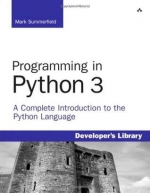Programming in Python 3. Mark Summerfield

Категория: Python
Поделиться:
Python is probably the easiest-to-learn and nicest-to-use programming language in widespread use. Python code is clear to read and write, and it is concise without being cryptic. Python is a very expressive language, which means that we can usually write far fewer lines of Python code than would be required for an equivalent application written in, say, C++ or Java. Python is a cross-platform language: In general, the same Python program can be run on Windows and Unix-like systems such as Linux, BSD, and Mac OS X, simply by copying the file or files that make up the program to the target machine, with no “building” or compiling necessary. It is possible to create Python programs that use platform-specific functionality, but this is rarely necessary since almost all of Python’s standard library and most third-party libraries are fully and transparently cross-platform. One of Python’s great strengths is that it comes with a very complete standard library—this allows us to do such things as download a file from the Internet, unpack a compressed archive file, or create a web server, all with just one or a few lines of code. And in addition to the standard library, thousands of thirdparty libraries are available, some providing more powerful and sophisticated facilities than the standard library—for example, the Twisted networking library and the NumPy numeric library—while others provide functionality that is too specialized to be included in the standard library—for example, the SimPy simulation package. Most of the third-party libraries are available from the Python Package Index, pypi.python.org/pypi.
Скачать
Комментарии